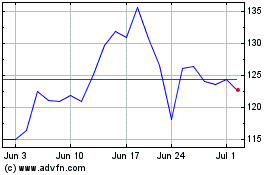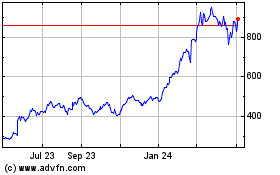By Cara Lombardo, Maureen Farrell and Asa Fitch
This article is being republished as part of our daily
reproduction of WSJ.com articles that also appeared in the U.S.
print edition of The Wall Street Journal (September 14, 2020).
The impending sale of Arm Holdings to Nvidia Corp. for $40
billion could have wide-ranging implications for the global
semiconductor industry, further elevating one of its highest fliers
and unwinding another big bet by SoftBank Group Corp.
The Japanese technology conglomerate said late Sunday that it
has reached a deal to sell Arm to Nvidia for a mix of cash and
stock, confirming a report Saturday by The Wall Street Journal.
Nvidia will pay $21.5 billion in stock and $12 billion in cash.
SoftBank may also receive up to $5 billion in cash or stock subject
to Arm hitting financial-performance targets. Nvidia will also
issue $1.5 billion in stock to Arm employees.
Nvidia, which makes graphics processors, and Arm, which designs
microprocessors that power most of the world's smartphones, may not
be household names, but they are some of the biggest players in the
chip industry. A union would instantly lift Nvidia, whose stock has
been one of the market's best performers this year, into a dominant
force in the market for smartphones and a big supplier of
technology for a range of other devices from smart speakers to
fitness trackers.
The deal, one of the largest semiconductor takeovers ever, marks
a win for SoftBank and its chief executive, Masayoshi Son, which
bought Arm four years ago for $32 billion and had struggled to
jump-start growth in the business.
For Nvidia Chief Executive Jensen Huang, it is the biggest
gamble since he helped co-found the chip maker in 1993.
Nvidia is a fast-growing industry player best known for making
the graphics chips that power videogames like on the wildly popular
Nintendo Switch. The chips have been in hot demand during the
pandemic as lockdowns keep people at home.
Nvidia's chips also go into data centers that are increasingly
in demand as remote work has taken off, and they have become the
workhorses of artificial-intelligence calculations that have grown
as more businesses embrace automation.
Success in those markets has driven investor enthusiasm that has
led Nvidia to generate record sales in its most recent quarter and
its shares to double this year. With a market capitalization of
about $300 billion, Nvidia is the most valuable U.S. semiconductor
company after overtaking Intel Corp., whose stock has slumped amid
production missteps.
The deal would add around $1.9 billion in annual sales to the
$11 billion Nvidia, based in Santa Clara, Calif., posted for last
year. It would also add breadth to its relationship with customers,
including the world's largest smartphone makers, namely Apple Inc.
and China's Huawei Technologies Co., which would owe Nvidia license
fees for the use of Arm technology.
But buying Arm also carries risk for Nvidia.
Arm, founded in 1990 as a spinoff of a joint venture that
included Apple, designs blueprints for clients, including other
chip companies, to make smartphone processors. Its designs are used
in processors that power around 90% of the world's smartphones and
in many other types of mobile chips.
Following a sale to Nvidia, customers like Samsung Electronics
Co., Apple and Qualcomm Inc. would face the prospect of one of
their chip-making competitors owning Arm, potentially undermining
its attractiveness as a neutral supplier.
Analysts have said that a Nvidia purchase of Arm wouldn't go
down well, with Bernstein Research's Stacy Rasgon writing in a note
that any single company acquiring Arm "would wield enormous power
over competitors," calling the outcome "an unpalatable
situation."
The deal also is likely to face regulatory scrutiny,
particularly given the heightened tensions between the U.S. and
China that have led to close reviews of semiconductor deals.
President Trump blocked Broadcom Inc.'s $117 billion takeover bid
for San Diego-based mobile- phone chip maker Qualcomm Inc. in 2018,
amid fears that it could hamper U.S. dominance in emerging 5G
technology. Qualcomm's proposed $44 billion purchase of Dutch chip
maker NXP Semiconductors NV fell through after China failed to give
its approval.
Nvidia's biggest acquisition to date, a $7 billion deal for
Mellanox Technologies Ltd., faced delays because of protracted
regulatory scrutiny in China. It closed in April.
China could bristle at the idea of Arm, a company used by many
Chinese smartphone makers, falling into the hands of an American
company. Arm's ownership, first as a publicly traded British
company and later as a subsidiary of Japan's SoftBank, largely kept
it outside the fray of Sino-American friction.
The transaction, which would make SoftBank one of Nvidia's
largest shareholders, is one of a series of big asset sales by the
Japanese firm.
It had been under pressure to shore up its flagging stock price
and promised some $40 billion in asset disposals. Most or all of
that is already under way or completed, and SoftBank shares are up
more than 20% this year. Among the sales: big chunks of its
holdings in China's Alibaba Group Holding Ltd. and T-Mobile US Inc.
following the wireless provider's merger with Sprint Corp.
At SoftBank, Mr. Son has been working with a small team to
negotiate the Arm deal including the chief executive of the chip
company, Simon Segars, Chief Financial Officer Yoshimitsu Goto as
well as Rajeev Misra, CEO of the firm's giant Vision Fund, and
Akshay Naheta, another SoftBank executive.
Write to Cara Lombardo at cara.lombardo@wsj.com, Maureen Farrell
at maureen.farrell@wsj.com and Asa Fitch at asa.fitch@wsj.com
(END) Dow Jones Newswires
September 14, 2020 02:47 ET (06:47 GMT)
Copyright (c) 2020 Dow Jones & Company, Inc.
NVIDIA (NASDAQ:NVDA)
Historical Stock Chart
From Mar 2024 to Apr 2024

NVIDIA (NASDAQ:NVDA)
Historical Stock Chart
From Apr 2023 to Apr 2024
